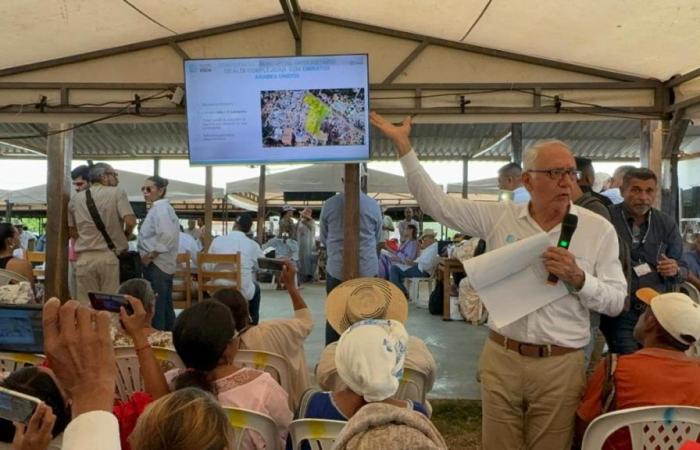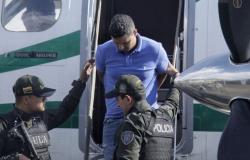More than 2,500 indigenous authorities participated in the IV meeting of ancestral and traditional authorities of the Wayúu peoplecarried out in the municipality of Maicao, whose The main focus was on health, in a dialogue with the National Government through the Ministry of Health and Social Protection.
At the meeting, which took place in the community of La Paz, the authorities indigenous people socialized their concerns about health reform and the comprehensive and intercultural health efforts they have been developing.
They heard them the Minister of Health, Guillermo Jaramillo; the director of the National Institute of Health, Giovanny Rubiano García; the Superintendent of Health, Luis Carlos Leal; Adress, and Senator Martha Peralta, president of Senate Commission VII,
Delegates from the negotiation table, health commissioners, palabreros and ancestral and traditional authorities spoke with officials of the National Government and presented the IV mandate of the Wayuu people, which contains the requirements for their own health system.
The speaker (Pütchipü’ü) Orangel Gouriyu, once again handed over the mandate to the National Government, indicating that they have been handing it over for over a year, even to President Gustavo Petro himself, for which they asked for great respect for the word, since they are fulfilling their word within the Wayú Normative System and are not taking action.
In this regard, Senator Martha Peralta provided an overview of the situation faced by indigenous communities in La Guajira in accessing health care: “We are going to present a new health reform, and we will do it as we are doing here, reaching consensus and reaching agreements with the people, without the risk of the IPS disappearing.”
Health Ministry officials clarified that it is completely false that there is any intention to end the IPS and mentioned their commitment to achieving an increase in the UPC to 12%.
For his part, Minister Jaramillo specified that the Indigenous Intercultural Health System (SISPI) must be a public system, “we will not wait for a Health Reform, but throughout the month of July and under the leadership of Vice Minister Jaime Urrego we will work together with the community to present a proposal to President Gustavo Petro with the objective that SISPI is conceived as a manager of public life.”
Agreements reached
Several points of collaboration were agreed upon with the Ministry of Health, with the aim of strengthening the indigenous health system and improving the living conditions of the Wayúu people.
Among the agreements reached, the need to establish the SISPI as a public health system organized by indigenous peoples and indigenous territories stands out, clearly defining the institutions and powers that make it up.
In addition, it was agreed that the Wayúu people’s own health institutions, made up of indigenous authorities, will be the only ones to operate the SISPI in their ancestral territory, prioritizing care for the Wayúu people.
The commitment to strengthening Anas Wayuu, the indigenous health institutions of the Wayú people, was reaffirmed. Likewise, compliance with Laws 691 of 2001 and 1751 of 2015 was insisted on, recognizing the unique organizational forms of the Wayuu People.
The Wayuu authorities asked the President of the Republic, Gustavo Petro, to cease the attacks against their institutions and collaborators, and to recognize the efforts in solving health problems. The need for a Life Plan for the Wayuu People was also raised, with sufficient resources to rebuild the economy and promote sustainable activities, including the participation of multilateral organizations with experience in this area.
In addition, they requested the creation of a new mechanism for consultation and agreement with the Wayú people, made up only of their ancestral and traditional authorities, in accordance with ILO Convention 169.
The importance of the participation of the Wayú people in the consultation prior to the constitution of the SISPI and the articulation of actions to address the social determinants that affect their community was highlighted, with emphasis on resolving famine, “in such a way that not only “Focus on averting the effects that hunger causes on the health and lives of our people,” the authorities indicated.
To represent the Wayuu People before the National Government, the Alaula and ancestral authorities Edicto Barroso Sijona, Juan Cambar Pushaina, Rosalinda Aguilar Uliana, Orangel Gouriyu, Marcos Jayaliyu, Angel Navas Jayaliyu and Luis Fernando Hernández Pushaina were appointed.
Also present were the governor of La Guajira Jairo Aguilar, and the mayors of Maicao and Albania, Miguel Felipe Aragón and Nera Robles Boniventon and the director of Indigenous Affairs, ROM and Minorities, Taita Germán Carlo. The ancestral and traditional authorities reiterated their commitment to work together for the health of the Wayuu people.
Eliana Mejia Ospino
Special for El Tiempo
Riohacha






